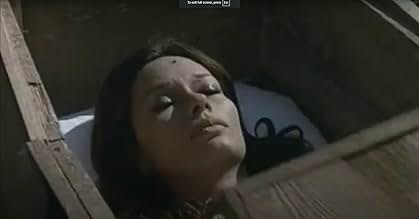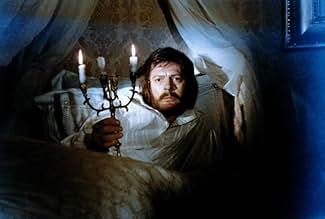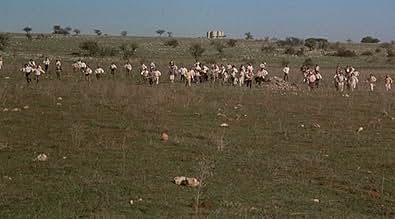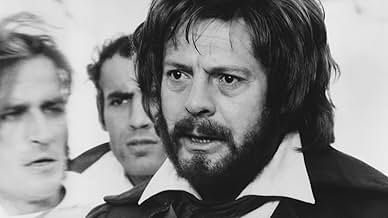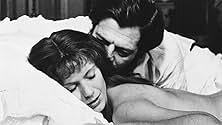VALUTAZIONE IMDb
7,0/10
1389
LA TUA VALUTAZIONE
Aggiungi una trama nella tua linguaA anarchist leader (Fulvio) wishes to retire, as he is old and tired. He tries to hide himself, but his friends find him and insist he carries on helping them.A anarchist leader (Fulvio) wishes to retire, as he is old and tired. He tries to hide himself, but his friends find him and insist he carries on helping them.A anarchist leader (Fulvio) wishes to retire, as he is old and tired. He tries to hide himself, but his friends find him and insist he carries on helping them.
- Regia
- Sceneggiatura
- Star
- Premi
- 3 candidature totali
Recensioni in evidenza
Dreadful and pretentious film. The script is plain awful - scenes are entirely disconnected, with things happening without any logic or reason. Entire parts could be cut out because they serve absolutely no purpose (for instance, Fulvio taking his son Massimiliano to a restaurant). Many scenes pretend to have a lot of "significance" but are void of any true meaning whatsoever (for example, their sensual eating of gelato or the carnival woman "giving birth"). The various battle scenes are the quality of Monty Python skits, and monologues often reminded me of middle school productions. The Taviani brothers are enamored with setting up beautiful "tableaux", but without any true justification, these artful images just look pretentious. I have been a great admirer of Italian cinema (and indeed of most things Italian) for many years, but at times one must recognize an abysmal work for what it is.
Of course you have to like the Taviani brothers style, something rather hard for viewers contaminated with the fast moving, predictable (even when trying hard to be unpredictable) plots of Hollywood McDonalds-style commercial movies. Taviani brothers take a bitter look at Italy of the '70's, the time when several leftist revolutionary groups, like the Brigade Rosse, the Autonomia Operaia and the Lotta Continua, chose the path of armed struggle against Italian capitalism, ending in a horrible massacre of politicians, judges, and innocent people. Just like them Fulvio, is of a wealthy, aristocratic origin and his revolutionary stance is just sentimental, not backed by real-life status. He gets easily disillusioned, but, caught in a moving sand, however he struggles to reclaim his past life he gets trapped and is swallowed in the end. It is hard to watch a film that you cannot identify with anyone, but it is worth a try.
This movie is a quite open metaphor for the attitude of many leftists in Italy (and elsewhere) in the 70s. It's about Fulvio, a man who left his house and loving and wealthy family (and also an illegitimate son) in order to free the poor and oppressed and to become a full-time revolutionary agitator, and who - after only 3 months in prison and the suicide of a comrade - decides that it was all a mistake and that he should go back and live with his brother and sister in their villa, where he is pampered by old, mama-like servants, seeking happiness in family life. But his past thwarts his project, first when his ex-lover (an emancipated, passionate, Hungarian revolutionary woman, beautifully played by Lea Massari) appears at his home, mocking his family and shocking the servants with her manners, then when the whole bunch of revolutionary, Utopian friends of Fulvio tries to involve him in a crazy plan: initiate a revolution in poor, backward, oppressed Southern Italy. Fulvio gets involved in the plot against his will. The more he tries to get away from his former comrades, the more - ironically - he gets deep into the plot, till the sad, grotesque end. Taking place during the Restoration which followed the fall of Napoleon and seemed to mark the defeat of ideals created by the French Revolution, the movie is a bitter reflection about the fact that in everyone, even in the most revolutionary and idealist persons, there is a part which is counter-revolutionary and anti-idealistic. Fulvio is willing to betray his friends and comrades in order to live a quiet life, having lost every interest and hope in fighting injustice and oppression. It's a movie about political engagement and the following delusion, about a suicidal courage in pursuing ideas which are absolutely unrealizable and the cowardice of those who just want to enjoy life (as long as they are on the sunny side of it...), about individualism and blind dedication to THE cause and to the party/group/revolution etc. It's a sad movie in which the main figures oscillates between appeasement with the existing injustice (Fulvio's private, inner Restoration) and empty, finally pointless revolutionary beau gestes (like his comrades). We follow Fulvio and his friend from a lovely, rich Lombardy (with its villas, lakes, hills), in which men and Nature seem to harmonize perfectly, to a bare, sun battered countryside of Southern Italy (with its extremely poor towns), in which the unnaturally red jackets of the revolutionaries stand out as something which do not belong there at all. When still in Lombardy, Fulvio seeks villas and palaces, but his friends force him always to go to abandoned places, ruins, warehouses. They offer him nocturnal bivouacs instead of well furnished dining rooms like the one he brings once his illegitimate son. But they act in the name of an ideal, he in the name of his individual happiness. Is a conciliation of both motives possible? The ending of the movie seems to give a deluded, cynical answer to the question.
As an Italian period film taking place in the early 1800s, we get everything we would suppose out of the viewing experience in these two hours. The filming locations are utterly gorgeous, and the production design and art direction are flush with equally beautiful detail. The hair, makeup, and especially the costume design are just as fetching and attentively realized, and even the lighting and cinematography are sights for sore eyes. The stunts and practical effects on hand look terrific, and to much the same point, the cast give firm, commendable performances to bring the drama to bear. It's a compelling if dark and somewhat grim story that brothers Paolo and Vittorio Taviani give us: the story of a bitter, disillusioned revolutionary, and those he cruelly betrays while selfishly seeking a more comfortable life. All along the way one can plainly see and feel how lovingly this was crafted, with some particular odds and ends standing out (including a brief sequence near the end), and the original score of master composer Ennio Morricone is simply a gift. By and large, 'Allonsanfàn' is excellent, and it's well worth watching no matter what one is looking for.
That doesn't mean it's perfect. While Morricone's dominant theme is a treasure - there's a reason Quentin Tarantino would notably borrow it thirty-four years later - I'm struck by how little variety there is in the music, and I can't help but wonder if said theme would be more effective if it were exercised more sparingly. In other regards I'm not so certain what it is that bugs me about the picture, but it arises somewhere between the Taviani's writing and direction. It's a marginal lack of total clarity, perhaps, in how characters are introduced or beats laid out, or maybe a slight lack of finesse: amorphousness and curious hard edges, both at once and made more pronounced by some small tidbits that feel unnecessary or indulgent. None of this is nearly so severe as to specifically detract from the feature, but truthfully I just don't find the whole to be as rich and vibrant as I supposed based on scant foreknowledge. (For the record, said foreknowledge includes two seconds-long clips removed from context, Morricone's theme, and the premise.) 'Allonsanfàn' is solid, engaging, enjoyable, and satisfying, but it's not altogether grabbing or rewarding.
Maybe I'm nitpicking, though. Far more than not we get what we want, and this is well written and well made, a testament to the skills of those involved with regards to both film-making and storytelling, not to mention acting. Scrutinize as we may, all told there's not much going wrong with this title, and to the extent that it falls short it's a matter of semantics, or personal preference, more than substance. I'd stop short of saying 'Allonsanfàn' is a must-see, but whatever your impetus for watching it's well worth checking out, and at length, maybe that's all it needs to be.
That doesn't mean it's perfect. While Morricone's dominant theme is a treasure - there's a reason Quentin Tarantino would notably borrow it thirty-four years later - I'm struck by how little variety there is in the music, and I can't help but wonder if said theme would be more effective if it were exercised more sparingly. In other regards I'm not so certain what it is that bugs me about the picture, but it arises somewhere between the Taviani's writing and direction. It's a marginal lack of total clarity, perhaps, in how characters are introduced or beats laid out, or maybe a slight lack of finesse: amorphousness and curious hard edges, both at once and made more pronounced by some small tidbits that feel unnecessary or indulgent. None of this is nearly so severe as to specifically detract from the feature, but truthfully I just don't find the whole to be as rich and vibrant as I supposed based on scant foreknowledge. (For the record, said foreknowledge includes two seconds-long clips removed from context, Morricone's theme, and the premise.) 'Allonsanfàn' is solid, engaging, enjoyable, and satisfying, but it's not altogether grabbing or rewarding.
Maybe I'm nitpicking, though. Far more than not we get what we want, and this is well written and well made, a testament to the skills of those involved with regards to both film-making and storytelling, not to mention acting. Scrutinize as we may, all told there's not much going wrong with this title, and to the extent that it falls short it's a matter of semantics, or personal preference, more than substance. I'd stop short of saying 'Allonsanfàn' is a must-see, but whatever your impetus for watching it's well worth checking out, and at length, maybe that's all it needs to be.
On the video box of Allonsafan, I noticed that someone had written in small letters, "Boreing". So, was it? On the whole, I am not the biggest fan of Italian films, and Marcello Mastrianni I always feel is his and miss. But actually, Ansofan isn't as bad a film that many people perceive it to be, although it essentially goes all over the place, the film is somewhat entertaining. Mastrianni is certainly OUT there playing a member of a criminal gang. He wants to go straight, but members of his gang keep showing up every time he's trying to go straight. He also has a son to think about! And his love life! Nevertheless, the gang members seem to follow him like a bad rash, even when he tries to kill the annoying pests. What this all is supposed to mean is rather confusing, and the ending is pretty predictable if you've been paying attention to this love/hate relationship thing Mastrionni has got going. Not entirely boring, but then again, not entirely comprehensible either.
Lo sapevi?
- QuizTitle derived from the first two words of the French national anthem.
- ConnessioniEdited into Marcello, una vita dolce (2006)
I più visti
Accedi per valutare e creare un elenco di titoli salvati per ottenere consigli personalizzati
- How long is Allonsanfan?Powered by Alexa
Dettagli
- Tempo di esecuzione1 ora 55 minuti
- Mix di suoni
- Proporzioni
- 1.85 : 1
Contribuisci a questa pagina
Suggerisci una modifica o aggiungi i contenuti mancanti

Divario superiore
By what name was Allonsanfàn (1974) officially released in India in English?
Rispondi
